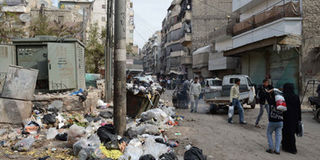Brahimi unsure whether Syria ceasefire would hold

PHOTO | PHILIPPE DESMAZES Syrians walk past piles of rubbish lying in the street in Syria's northern city of Aleppo, on October 24, 2012. The UN Security Council called on the Syrian government and opposition to heed peace envoy Lakhdar Brahimi's appeal for a ceasefire in their 19-month-old war.
What you need to know:
- The 15-nation council issued a statement backing the ceasefire after Brahimi outlined how the conflict is worsening but added that President Bashar al-Assad had accepted his proposal
- The council reaffirmed demands for the government to allow "full and unimpeded humanitarian access" to cities where activists say more than 35,000 people have been killed in the past 19 months
- In a video presentation from Cairo, Brahimi told a closed-door meeting of the council that Assad has accepted his proposal but that he was waiting for the government's formal statement which is expected on Thursday
UNITED NATIONS
The UN Security Council on Wednesday called on the Syrian government and rebels to embrace a ceasefire brokered by special envoy Lakhdar Brahimi even though he was not sure it would hold.
The 15-nation council issued a statement backing the ceasefire after Brahimi outlined how the conflict is worsening but added that President Bashar al-Assad had accepted his proposal.
The council urged major powers and countries around Syria to "use their influence" on the rival sides to push for the halt to hostilities during the four day Eid al-Adha holiday starting Friday.
It called on all sides, in particular on the Syrian government "as the stronger party", to agree to the initiative of the UN-Arab League envoy.
The council reaffirmed demands for the government to allow "full and unimpeded humanitarian access" to cities where activists say more than 35,000 people have been killed in the past 19 months.
In a video presentation from Cairo, Brahimi told a closed-door meeting of the council that Assad has accepted his proposal but that he was waiting for the government's formal statement which is expected on Thursday.
The opposition Free Syrian Army has said it will halt hostilities if the government does, but is not optimistic that Assad will keep to any deal.
Russia's UN envoy Vitaly Churkin told reporters his government has had "indications that they (the Syrian government) are accepting the proposal of Mr Brahimi."
France's UN ambassador Gerard Araud said that Brahimi was "cautious" ahead of the Syrian government statement.
"We attach hope to the initiative of Mr. Brahimi but at the same time we remain cautious and realistic in view of the fact that Assad and his government have not honored their pledges in the past," said Germany's UN envoy Peter Wittig. "The onus is on the Syrian government to deliver."
Referring to his ceasefire proposal to Assad, diplomats at the meeting quoted Brahimi as saying, "I hope a small step can lead to more."
The envoy stressed the lack of trust between the two sides and said he "cannot be certain that a truce will be effective," diplomats told AFP.
The envoy said there is no "safe place" for civilians in Syria with the army shelling "indiscriminately" and both sides ignoring humanitarian law and human rights.
Brahimi said he wanted the ceasefire to "help create political space for discussion and let humanitarian assistance flow in." The envoy said it was essential to get aid to to the stricken Syrian cities of Aleppo, Homs and Idlib.
Brahimi told the council it was essential that he receive "unambiguous" support for his ceasefire efforts. "Another failure would lead to the worsening of the conflict and extension to other countries," he told envoys.
The council remains critically split, however, on international action over the war. Russia, Assad's last main ally, and China have blocked three council resolutions proposed by Western nations which could have led to sanctions against Assad.
US Secretary of State Hillary Clinton renewed calls on Wednesday for the Security Council to impose "consequences" for those who block any ceasefire or political transition in Syria.
Clinton said in Washington that the United States and other major powers had "worked very hard" to agree a document on a document for a transition in Geneva in June.
"We would like to see the Security Council adopt such a framework but to include some consequences for all parties in the event that there is not a cease-fire respected for a political transition" to start.




